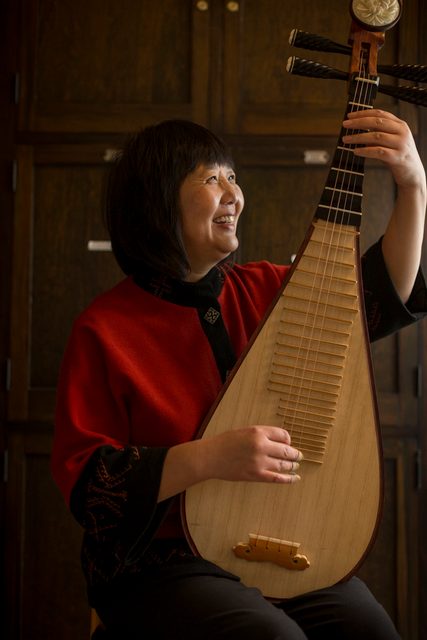 A coin flip at Carleton changed Andrew Terwilliger’s life forever. During his freshman year, Terwilliger ’10 used the time-honored tradition of “heads or tails” to determine which language he’d study. After Chinese won the flip over Greek, he took the advice of his teaching assistant and attended a Carleton performance by Chinese music instructor Gao Hong.
A coin flip at Carleton changed Andrew Terwilliger’s life forever. During his freshman year, Terwilliger ’10 used the time-honored tradition of “heads or tails” to determine which language he’d study. After Chinese won the flip over Greek, he took the advice of his teaching assistant and attended a Carleton performance by Chinese music instructor Gao Hong.
“When I saw Gao Hong on stage, I said to myself, ‘I need to take lessons from her. I don’t care what else is going on in my life at Carleton. This is something that I have to do,’ ” Terwilliger says.
True to his word, he began private lessons, eventually immersing himself in all things Chinese on campus. Terwilliger later received the prestigious Thomas J. Watson Fellowship, a dream grant that allowed him to independently study music in Taiwan, Hong Kong, Singapore, and Japan after graduation. He is currently playing and teaching music in Taiwan as part of a Fulbright scholarship through Wesleyan University, where he also helps direct their Chinese music ensemble.
“Before Carleton, I always liked music but was intimidated by it. Gao Hong changed that. She taught me that music is for everybody,” Terwilliger says. “I owe her everything. She opened up the whole world of Chinese music to me.”
Under the direction of Gao Hong, a world-class pipa artist who started playing professionally in China as a child, Carleton’s student ensemble continues to earn raves as one of the best in the country. “Everywhere I go, people can’t believe that Carleton—in the middle of nowhere, to them—has this amazing Chinese music ensemble,” she says. She’s quick to credit music professor Melinda Russell for helping her compile the mélange of exotic instruments that gives life to the rotating ensemble. “It’s taken 14 years to accumulate the collection we have. Every year, Melinda says to me, ‘What do you need?’ Carleton understands that it’s a pioneer for this.”
Students find more than Chinese music at Carleton—they can study music traditions from around the world in the classroom, and lessons or ensembles are offered in sitar, oud, African karimba and mbira, Indian raga, and drumming in West African, Cuban, North Indian, and Middle Eastern styles. Plus, students who play any instrument—Western or otherwise—can play together in a new Global Music Ensemble.
Like Terwilliger, most of Carleton’s global music students “start from zero,” Gao Hong says, and they experience little pressure to conform to an ideal standard of musicianship.
Instead, Carleton’s organic approach allows students to determine how they want to be taught, which ultimately fuels enthusiasm and interest, says Jay Johnson, who directs Carleton’s African Drum Ensemble. “I’ve been doing this for 28 years, and I absolutely love the fact that every student is at a different level with a different interest,” Johnson says. “I get to look right in the eye of that individuality and ask, ‘All right, what can we do?’ How can you ask for anything better than that as a teacher?”
